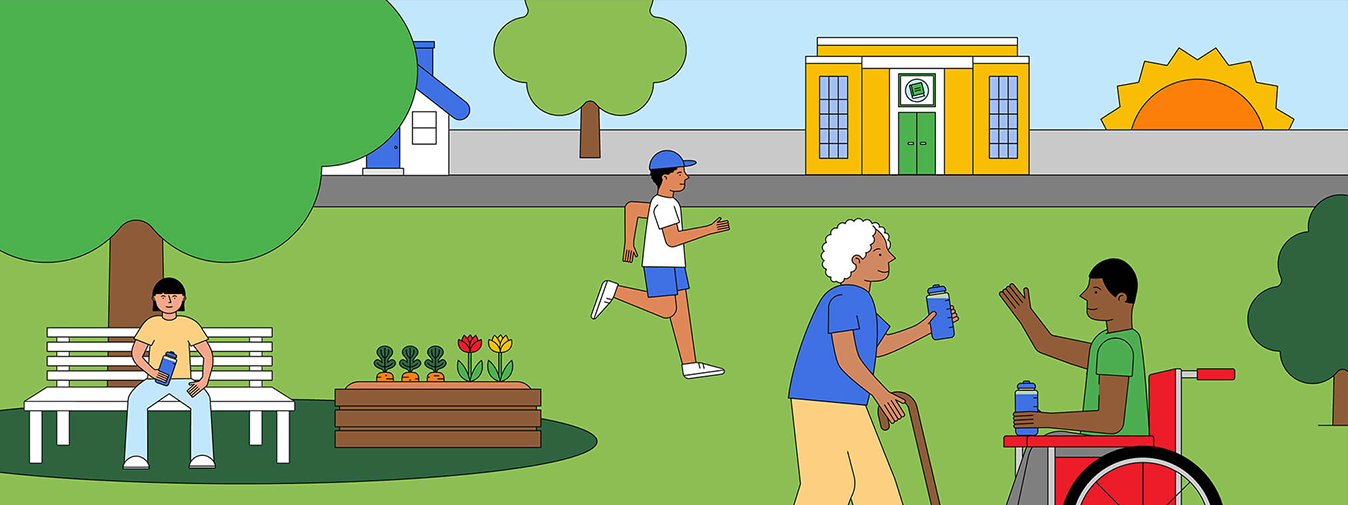


Extreme heat is a leading cause of weather-related deaths in the U.S. Many people, including those most at risk,1 are unaware of the danger as these events happen more often, last longer and become more intense, especially in places that don’t usually have them.
The American Red Cross wants you to take action. Protect yourself, your loved ones and your neighbors by staying connected with your community. It could save a life.
Learn how to protect yourself and your loved ones when temperatures rise.
Extreme heat can be dangerous for anyone, but
some people are at higher risk of getting sick.

Older Adults
Their bodies can't cool down as fast, making them more vulnerable.

Babies and Young Children
Their bodies can't cool down as well as adults, making them more likely to overheat, lose too much water, and get very sick.

People with Chronic Health Conditions or Those Who Take Medications
Conditions like heart disease, poor blood flow, diabetes, obesity or breathing issues can increase the risk of getting sick. Plus, some medications can make it harder to stay cool.

Pregnant Women
Their bodies need to work harder to keep themselves and their baby cool.

People with Disabilities
People with physical or cognitive disabilities, without access to transportation, or who need help with daily tasks may have more difficulty staying cool.

People Using Drugs or Alcohol
Alcohol and certain drugs can interfere with the body's ability to stay cool and hydrated.

People without Air Conditioning, Experiencing Homelessness or Living Alone
For some, there are fewer ways to escape the heat, making cooling down harder. Others may not notice the warning signs of overheating or have anyone to help them in an emergency.

Athletes
Exercising in hot weather raises body temperature and increases sweating, which can cause dehydration. Athletes sweat a lot, but in the humidity, sweat doesn't dry as fast, keeping the body hot. Heavy gear (like football pads) can trap heat and make it harder to stay cool. Some athletes push too hard and ignore warning signs like dizziness or muscle cramps, which can be dangerous.

Outdoor Workers
People who work outside need to be extra careful to stay cool and hydrated during extreme heat.
Stay ahead of the heat by being prepared and staying protected. These simple steps can help anyone stay safe when temperatures rise.

The combination of a power outage and extreme heat can be especially deadly.
It’s important to prepare in advance.2

Stay in the Shade: Being in the shade outside might be cooler than staying in a home without air conditioning.

Find a Cool Indoor Space: If your home gets too hot, then have a safe place to go, like a friend’s house, a mall, the library or a cooling center.

Stock Up on Emergency Supplies: Keep an ice-filled cooler stocked with food, water and medicine, so they don’t spoil. Have extra batteries and battery packs to be prepared.

Plan Ahead for Medical Needs: Talk to your doctor about a backup plan for powering medical devices.
Look out for your loved ones and neighbors—especially older adults, people with chronic conditions or disabilities, pregnant women, outdoor workers and athletes.
Send a text, make a call, keep an eye out or knock on their door.
It could make all the difference.




Get the Emergency App today to help you and your loved ones prepare before, during and after a disaster. Access quick guides, receive National Weather Service alerts, view live weather maps and find nearby Red Cross shelters and services.

Know what it is - Heat cramps are painful muscle cramps or spasms in your arms, legs, or stomach that happen when you sweat too much. They’re warnings that your body is overheating and a reminder to cool down before you become sicker.
Know the possible signs - Heavy sweating, muscle pain or cramping.
Know what to do - Stop what you're doing, rest in a cool place and slowly sip water. If you feel sick to your stomach, stop drinking. Get medical help if cramps last more than an hour or if you have heart problems.

Know what it is - Heat exhaustion is a more serious illness that can become deadly if not treated. It happens when your body loses too much water and salt, usually from sweating too much in hot weather.
Know the possible signs - Heavy sweating, weakness, cool and clammy skin, muscle cramps, dizziness, fainting, nausea or vomiting.
Know what to do - Stop what you're doing, rest in a cool place, and slowly sip water. If you feel sick to your stomach, stop drinking. Loosen your clothes and place a cool, wet cloth on your body. Get medical help if you're vomiting or don’t feel better.

Know what it is - Heat stroke is deadly and requires immediate medical care, especially if the person loses consciousness.
Know the possible signs - High body temperature, rapid heartbeat, confusion, headache, dizziness or fainting, nausea or vomiting. Their skin may be hot and dry, or they may be sweating.
Know what to do - Call 911 right away. Move them to a cooler place and remove extra clothing. Cool them with a wet cloth or a cool bath. Do NOT give them anything to drink.